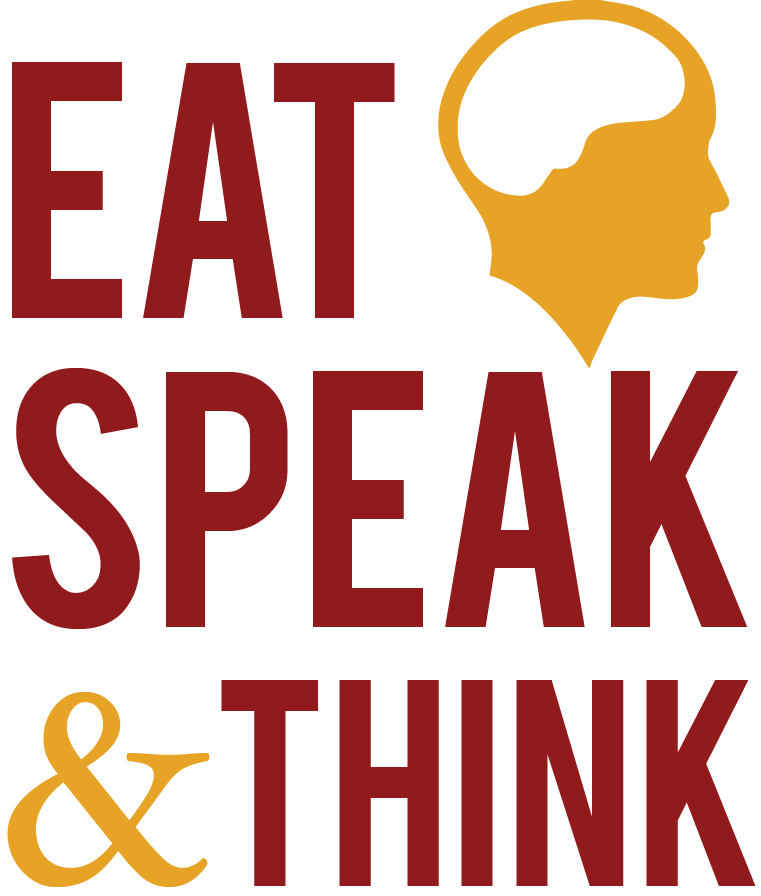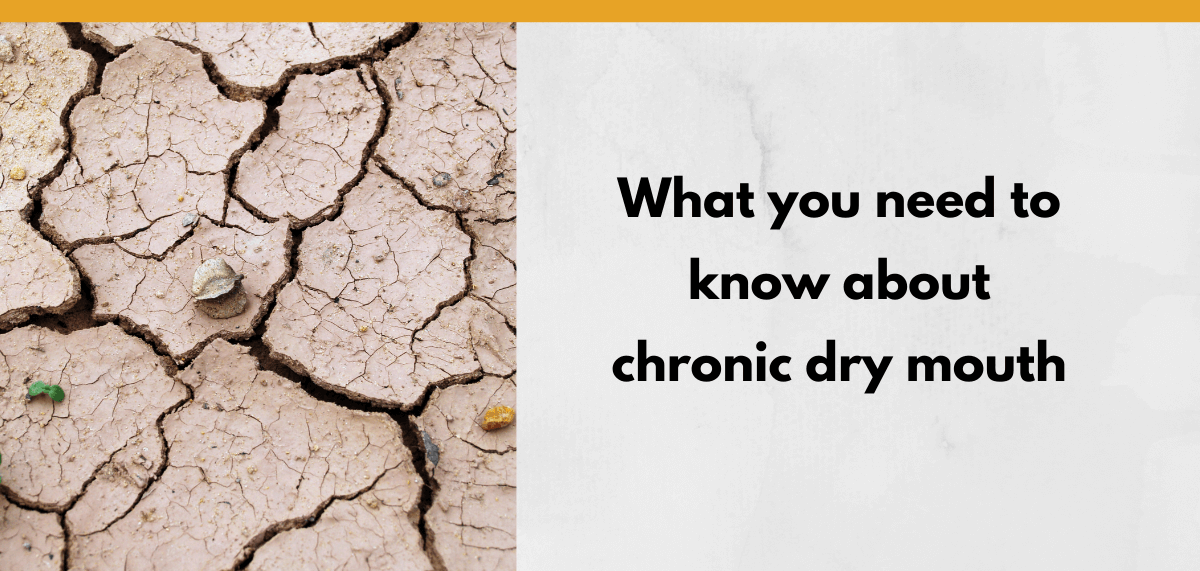Chronic dry mouth, or xerostomia, is a common complaint that speech-language pathologists hear often. In this article, I team up with C. Michael White, Pharm.D., FCP, FCCP from the UConn School of Pharmacy. We talk about the many benefits of saliva, what goes wrong with chronic dry mouth, and tips for how to help.
Free DIRECT download: The patient’s guide to dry mouth (handout). (Email subscribers get free access to all the resources in the Free Subscription Library.)
Outline:
- Facts about saliva.
- Chronic dry mouth can cause many problems.
- Xerostomia is the medical term for chronic dry mouth.
- Common causes of chronic dry mouth.
- Many medications can cause chronic dry mouth.
- Tell your doctor if you have a dry mouth.
- Avoid these foods, drinks, etc.
- Choose these foods and drinks.
- Mouth care tips.
- Tips for swallowing medication.
- If you still have trouble swallowing pills.
- Other things you can try.
- Professionals that may be able to help.
- References.
- Related Eat, Speak, & Think posts.
Facts about saliva
Saliva is one of those things we probably don’t spend much time thinking about unless something goes wrong. Here are some things you may not know about saliva:
- The average healthy young person produces a quart of saliva every day.
- Saliva is 99% water.
- The final 1% contains many important proteins, enzymes, and electrolytes.
- Saliva lubricates food and pills to help make swallowing safe and comfortable.
- Nutrients in saliva strengthen the teeth, preventing them from becoming brittle.
- Antibacterial proteins impede the growth of bacteria, reducing the risk of cavities and infection.
- Saliva starts the digestion of some sugars right in the mouth.
Chronic dry mouth can cause many problems
If dry mouth persists, it can cause many problems related to eating, drinking, tasting, and talking. If you have chronic dry mouth, the Mayo Clinic and Cancer.net share symptoms that you may have:
- thick saliva that is hard to swallow.
- mouth sores or cracked lips.
- tooth decay or gum disease.
- oral thrush, which is a yeast infection in your mouth or throat.
- difficulty tasting food.
- trouble chewing or swallowing.
- pain when swallowing dry food or pills.
- difficulty talking due to dry or sore tongue or lips.
- voice problems due to dehydration.
- trouble wearing dentures.
Xerostomia is the medical term for chronic dry mouth
Here’s how you say xerostomia: “zero-STOW-me-ah“.
Xerostomia can affect anyone, but people are more likely to experience it as they get older. The older we get, the more likely we are to experience it. For instance, 45% of people over the age of 80 experience xerostomia.
Women are twice as likely as men to have xerostomia. Xerostomia in women is more common after menopause.
Common causes of chronic dry mouth
Many things can cause xerostomia, or chronic dry mouth. The Mayo Clinic and Cancer.net share the most common:
- Side effect of certain medications.
- Dehydration.
- Tobacco, alcohol, or recreational drug use.
- Radiation therapy for head and neck cancer.
- Chemotherapy.
- Bone marrow or stem cell transplantation.
- Infection in the mouth, such as thrush.
- Nerve damage from injury or surgery.
- Autoimmune diseases like Sjogren’s syndrom or HIV/AIDS.
- Diabetes, Parkinson’s disease, Alzheimer’s disease, cystic fibrosis.
- Sleep apnea or chronic sinusitis.
- Problems associated with aging.
Many medications can cause chronic dry mouth
NOTE: Always follow your physician’s orders for taking your medications. This information is for educational purposes only. If you have questions about your medications, please talk to your doctor or your pharmacist.
Here are just a few commonly-used medications that can cause chronic dry mouth (Scully, 2003; Wolff et al., 2017):
- Anticholinergics (often used to treat asthma, urinary incontinence, and motion sickness): atropine, ipratropium, tiotropium.
- Sedating antihistamines: Benadryl, chlorpheniramine, hydroxyzine.
- Tricyclic antidepressants (used for depression, nerve pain, and to improve sleep): amitriptyline, desipramine, imipramine.
- Antipsychotics: chlorpromazine, clozapine, olanzapine.
- Antiarrhythmics (heart): mexiletine, disopyramide, procainamide.
- Anti-Parkinson’s: trihexyphenidyl, orphenadrine, amantadine.
- Anti-urinary incontinence: oxybutynin, flavoxate, solifenacin, tolterodine, trospium.
- Opioids: morphine, oxycodone, hydrocodone, fentanyl.
In addition, cancer treatments can cause chronic dry mouth. Chemotherapy drugs and radiation targeting the head and neck region can damage salivary glands.
Loop diuretics like furosemide, bumetanide, and torsemide can reduce the availability of water to make saliva if dosed too aggressively.
Amphetamines, stimulants, and decongestants can also cause dry mouth by opposing the effects of the cholingergic nervous system.
Finally, smoking tobacco or marijuana can dry out the mouth, as can drinking alcohol. Using methamphetamine can also dry out the mouth.
Tell your doctor if you have a dry mouth
If you have a dry mouth, it’s important that you tell your doctor. A dry mouth could be a symptom of an underlying problem.
If your chronic dry mouth is a side-effect of a medication, your doctor may change the dosage or change the medication itself.
Your doctor may also prescribe medication to stimulate saliva production.
Avoid these foods, drinks, etc
The following foods, drinks, and products can dry out the mouth or cause discomfort in an already-dry mouth:
- Caffeine (coffee, tea, soda, energy drinks, food enhanced with caffeine)
- Alcohol
- Alcohol-based mouthwash
- Sugary foods and drinks
- Acidic foods and drinks
- Dry, hard, crunchy foods
- Sticky foods
- Spicy foods
- Tobacco, marijuana, methamphetamine.
Choose these foods and drinks
- Water. Try sipping water constantly throughout the day. Follow your doctor’s advice for how much you drink.
- Caffeine-free and sugar-free beverages.
- Soft food. If needed, add sauce, gravy, or condiments so that it’s not dry.
- Look for xylitol in your foods and drinks containing sweeteners. Xylitol is a natural sweetener that inhibits that bacteria that cause cavities. Be careful though. Consuming large amounts of xylitol may cause diarrhea or cramps in some people.
- Other sweeteners that are recommended include carboxymethylcellulose and hydroxyethyl cellulose.
Mouth care tips
- Use a toothpaste that contains fluoride.
- If you use mouthwash, choose an alcohol-free product.
- Try saliva substitutes.
- Use a wax or lanolin-based lip balm. Find one with sunscreen.
- Try over-the-counter products for dry mouth relief. There are many products, here are a few:
*This is an Amazon affiliate link. As an Amazon associate, I may
earn a small commission on qualifying purchases. There is no extra
charge to you, and it will help keep Eat, Speak, & Think
sustainable.
Tips for swallowing medication
Swallowing pills can be challenging if your mouth and throat are dry. Here are some tips you can try. (If you have a swallowing impairment, ask your speech-language pathologist for recommendations.)
- Take a sip of water before you put the pill in your mouth.
- Place the pill towards the back of your mouth, then wash it down with water.
- Try drinking from a bottle or straw, instead of a cup.
If you still have trouble swallowing pills
Talk to your pharmacist for guidance on these possible options:
- A tablet form may be substituted for a capsule. Capsules are harder to swallow because they are usually lighter and stickier when they get wet.
- Cutting a pill in half could make it easier to swallow. Not all pills work when cut.
- Using a pill lubricant gel*, coating*, or spray* can be helpful. These products can’t be used with all medications.
- Place the pill whole or crushed in applesauce or pudding. Not all medications can be taken with food.
- Substitute a liquid, chewable, or powder form of the drug, if possible.
*This is an Amazon affiliate link. As an Amazon associate, I may
earn a small commission on qualifying purchases. There is no extra
charge to you, and it will help keep Eat, Speak, & Think
sustainable.
Other things you can try
- Carry water with you and sip it frequently. (Follow your doctor’s recommendation for how much you drink.)
- Chew sugar-free gum.
- Suck on ice chips or sugar-free hard candy.
- Keep water next to your bed. One of my patients hung a water bag* so she didn’t have to sit up in the night.
- Breathe through your nose instead of your mouth.
- Use a cool-mist humidifier when you sleep.
- Ask your doctor before using over-the-counter antihistamines and decongestants as these can worsen your symptoms.
*This is an Amazon affiliate link. As an Amazon associate, I may
earn a small commission on qualifying purchases. There is no extra
charge to you, and it will help keep Eat, Speak, & Think
sustainable.
Professionals that may be able to help
- Your pharmacist could identify medications that may be causing your dry mouth.
- Your medical provider could determine the cause of the dry mouth and provide treatment.
- Your dentist may recommend a prescription fluoride toothpaste, a fluoride rinse, or a fluoride gel that you brush on your teeth before going to bed. You should also see your dentist at least twice a year for regular check-ups and cleaning.
References
- Dry mouth, another PD symptom. (2019 January 15). ParkinsonsDisease.net. Retrieved 2/12/2022 from https://parkinsonsdisease.net/answers/dry-mouth-pd-symptom.
- Dry mouth or xerostomia. (2020, October). Cancer.Net. Retrieved 2/12/2022 from https://www.cancer.net/coping-with-cancer/physical-emotional-and-social-effects-cancer/managing-physical-side-effects/dry-mouth-or-xerostomia
- Head and Neck Cancer Alliance. (n.d.) What is dry mouth (xerostomia)? Retrieved 2/12/2022. https://www.headandneck.org/dry-mouth/
- Mayo Clinic. (n.d.) Dry mouth: Diagnosis and treatment. https://www.mayoclinic.org/diseases-conditions/dry-mouth/diagnosis-treatment/drc-20356052
- Mayo Clinic. (n.d.) Dry mouth: Symptoms and causes. https://www.mayoclinic.org/diseases-conditions/dry-mouth/symptoms-causes/syc-20356048
- Mayo Clinic. (n.d.) Dry mouth treatment: Tips for controlling dry mouth. https://www.mayoclinic.org/diseases-conditions/dry-mouth/expert-answers/dry-mouth/faq-20058424
- Mercadante, V., Jensen, S. B., Smith, D. K., Bohlke, K., Bauman, J., Brennan, M. T., Coppes, R. P., Jessen, N., Malhotra, N. K., Murphy, B., Rosenthal, D. I., Vissink, A., Wu, J., Saunders, D. P., & Peterson, D. E. (2021). Salivary Gland Hypofunction and/or Xerostomia Induced by Nonsurgical Cancer Therapies: ISOO/MASCC/ASCO Guideline. Journal of Clinical Oncology, 39(25), 2825–2843. https://doi.org/10.1200/JCO.21.01208
- Rowe M, Lawn C, Wilson B. (2018, October 22). Effects of papaya enzymes in patients with dry mouth. Oral Health Care 3: DOI: 10.15761/OHC.1000147 https://www.oatext.com/saliva-flow-and-quality-of-life-in-patients-with-dry-mouth-using-papaya.php#Article_Info
- Scully, C. (2003). Drug effects on salivary glands: dry mouth. Oral Diseases, 9(4), 1654-176. https://onlinelibrary.wiley.com/doi/full/10.1034/j.1601-0825.2003.03967.x
- Watson, K. (2019, May 20). How to swallow a pill: 8 methods worth trying. Healthline.com. https://www.healthline.com/health/how-to-swallow-a-pill#_noHeaderPrefixedContent
- Wolff, A., Joshi, R. K., Ekström, J., Aframian, D., Pedersen, A. M., Proctor, G., Narayana, N., Villa, A., Sia, Y. W., Aliko, A., McGowan, R., Kerr, A. R., Jensen, S. B., Vissink, A., & Dawes, C. (2017). A Guide to Medications Inducing Salivary Gland Dysfunction, Xerostomia, and Subjective Sialorrhea: A Systematic Review Sponsored by the World Workshop on Oral Medicine VI. Drugs in R&D, 17(1), 1–28. https://doi.org/10.1007/s40268-016-0153-9
Related Eat, Speak, & Think posts
- I’m having trouble swallowing. Now what?
- What SLPs should know about osteoporosis drugs and dysphagia.
- 10 factors that increase risk of aspiration pneumonia.
Free DIRECT download: The patient’s guide to dry mouth (handout). (Email subscribers get free access to all the resources in the Free Subscription Library.)
Featured image by icon0.com from Pexels.




An SLP recommended this textbook, which she used in her trach and vent course:
Xerostomia: An Interdisciplinary Approach to Managing Dry Mouth 1st Edition
by Sarah M Ginsberg EdD CCC-SLP ASHA Fellow
https://amzn.to/36NhdZJ (Affiliate link, if you make a purchase, EST may earn a small commission at no extra cost to you.)
Cherin Pace (a former dental hygienist/dental hygiene educator) made this comment in a private Facebook group and gave me permission to copy and paste her comment here.
*Xylitol- be careful as it is poisonous to animals.
*Avoid caffeine (coffee, tea, chocolate, soda) as it dehydrates tissues.
*speech therapists – beware of using lemon glycerin swabs as they cause dry mouth and can contribute to enamel erosion.
*Dental hygienists in general are more knowledgeable about xerostomia causes and treatments than dentists. However a Dentist will write Rx for fluoride supplements.
*Biotene- includes additional products such as toothpaste and chewing gum.
Important to note that these products only alleviate symptoms not the cause.
*Saliva “washes” the teeth, removing some of the microorganisms and biofilm. *Insufficient saliva can result in increased tooth decay (hence the need for fluoride supplements) and periodontal disease.
*Impeccable oral hygiene is critical and the dental hygienist may recommend professional cleanings more than twice/year.